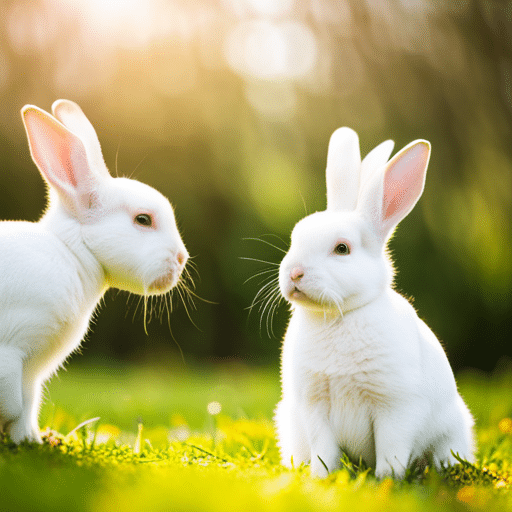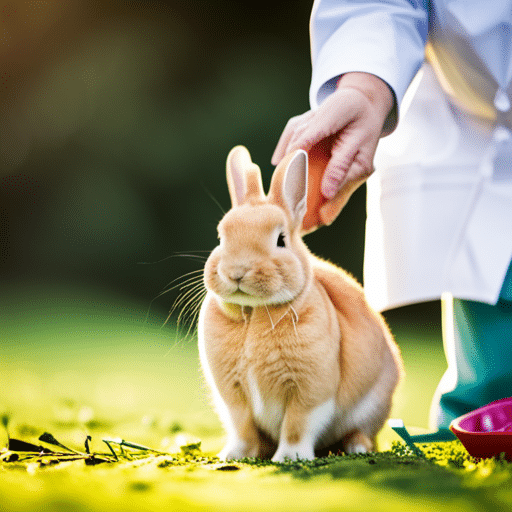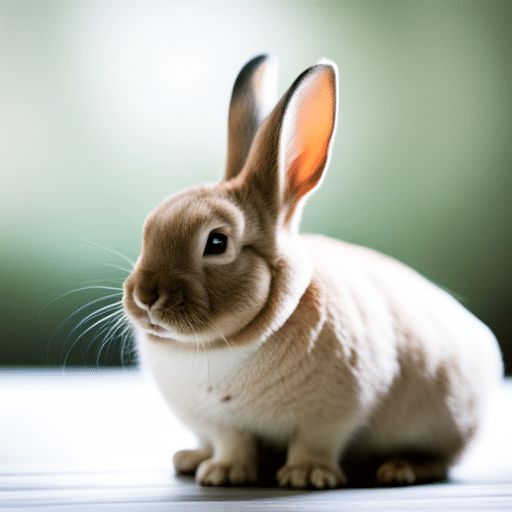Vaccines are an essential part of pet care for rabbits. Vaccinating your rabbit can help protect them from deadly diseases and infections, as well as improve their overall health and longevity.
But with so many different types of vaccines available, it can be difficult to know which ones your rabbit needs.
This guide will provide you with the information you need to make an informed decision about vaccinating your pet rabbit. We’ll discuss the diseases that rabbits are most prone what kinds of vaccines are available for those illnesses, and when they should be administered. With this comprehensive guide in hand, you’ll have all the knowledge necessary to keep your beloved companion safe and healthy for years to come!
The Importance of Rabbit Immunization

Rabbits are susceptible to diseases that can cause serious health problems, even death. Vaccines help protect rabbits from these potentially deadly illnesses by stimulating their immune system and helping them recognize and fight off harmful viruses.
Vaccines also reduce the chance of a rabbit coming in contact with any disease-causing organisms, as well as help to reduce the spread of those organisms to other rabbits. All of these benefits make vaccinating your rabbit an absolute must.
Why Vaccinating Your Pet Rabbit is Crucial
Rabbits can contract a number of dangerous illnesses, such as sniffles, coccidiosis, and rabbit viral hemorrhagic disease (RVHD). Without appropriate vaccines, these diseases can be deadly for your pet. Vaccines help protect rabbits from these serious health threats by stimulating their immune system and helping them recognize and fight off harmful viruses.
Understanding the Vaccination Process for Rabbits
Before vaccinating rabbits or your pet, it is important to understand the recommended vaccination schedule for rabbits. The exact schedule will vary depending on where you live and the particular kind of vaccine being administered. Generally speaking, a combination of two vaccines should be given: one against RHDV (Rabbit Hemorrhagic Disease Virus) and another against sniffles, coccidiosis, and myxomatosis.
Vaccines should be administered by a qualified veterinarian who is knowledgeable about the specific requirements for your rabbit’s vaccination schedule. The process typically involves injecting a small amount of the vaccine into the rabbit’s skin over its shoulder blades. After the initial injection, boosters should be given every 6 to 12 months.
What to Expect When You Take Your Rabbit for Vaccination
When you take your rabbit for vaccination, the veterinarian will ask questions about the animal’s health and lifestyle to make sure it is an appropriate candidate for immunization.
The vet may also perform a physical examination of the rabbit to check for any signs of illness or injury that could interfere with the vaccination process.
Core Vaccines for Pet Rabbits

Most rabbits should receive a combination of two core vaccines: one against RHDV (Rabbit Hemorrhagic Disease Virus) and another against sniffles, coccidiosis, and myxomatosis.
These vaccines are recommended for all pet rabbits regardless of their individual lifestyles or whether they live indoors or outdoors.
Overview of Essential Rabbit Vaccines
Listed below are the essential vaccines recommended for pet rabbits:
Rabbit Hemorrhagic Disease Virus (RHDV): This vaccine protects against the Rabbit Hemorrhagic Disease Virus (RHDV), which is highly contagious to many rabbits and can be fatal to unvaccinated rabbits.
Sniffles, Coccidiosis, and the Myxomatosis vaccine: This combination vaccine protects against respiratory diseases, coccidiosis, and myxomatosis. These common illnesses can cause severe health complications and even death if left untreated.
Non-Core Vaccines for Pet Rabbits
Non-core vaccines are optional vaccines that may be recommended for older rabbits, depending on their individual lifestyle and environment. These vaccines provide protection against diseases such as Pasteurella, Encephalitozoon Cuniculi, and Viral Haemorrhagic Disease (VHD).
The exact combination of non-core vaccines recommended for your rabbit will depend on your veterinarian’s assessment of the animal’s individual health, lifestyle, and environment.
Additional Vaccines that Might Benefit Your Rabbit’s Health
In addition to the core and non-core vaccines, there are other optional vaccines that may be beneficial for your pet rabbit such as the Rabies vaccine. Although rabies is not a common disease in rabbits, it can still pose a serious threat to both humans and animals.
Your veterinarian may also recommend additional vaccinations based on their assessment of your rabbit’s individual health, lifestyle, and environment.
Recommended Vaccination Schedule for Rabbits
The exact vaccination schedule for your pet rabbit will depend on the particular vaccines being administered and where you live, but generally speaking, a combination of two vaccines should be given: one against RHDV (Rabbit Hemorrhagic Disease Virus) and another against sniffles, coccidiosis, and myxomatosis.
Timing and Frequency of Rabbit Vaccinations
The initial injection of the vaccines should be administered by a qualified veterinarian, and booster shots should be given every 6-12 months. It is important to note that vaccinations may need to be administered more frequently for some rabbits, such as those living in high-risk environments or those with weakened immune systems.
Your veterinarian can provide specific recommendations about when and how often your rabbit should be vaccinated.
Common Rabbit Diseases Prevented by Vaccination
Vaccines help protect rabbits from a number of potentially deadly illnesses, with fatal diseases including:
• Rabbit Hemorrhagic Disease Virus (RHDV)
• Sniffles
• Coccidiosis
• Myxomatosis
• Pasteurella
• Encephalitozoon Cuniculi
• Viral Haemorrhagic Disease (VHD)
• Rabies
By administering the appropriate vaccines, you can help protect your pet rabbit from these serious illnesses and ensure it enjoys a happy and healthy life.
How Vaccinations Keep Your Rabbit Healthy
Vaccines help keep your pet rabbit healthy by stimulating its immune system to recognize and fight off harmful viruses. This helps to reduce the risk of infection from certain organ-specific diseases as well as the spread of contagious illnesses among rabbits. Vaccinating your pet rabbit is an essential part of responsible pet ownership and a crucial step in helping to keep your beloved companion rabbit happy, safe, and healthy for years to come.
Debunking Myths Around Rabbit Vaccination
When it comes to rabbit vaccination, there are a few common misconceptions that pet rabbit owners really should be aware of.
Myth 1: Vaccines Can Make Rabbits Sick
This is false. Vaccines stimulate the immune system, helping rabbits develop immunity to certain diseases without actually causing illness in the animal. In rare cases, some rabbits may experience minor side effects such as lethargy or a loss of appetite, but these should subside soon after the vaccination is administered.
Myth 2: Rabbits Don’t Need Vaccines
This is also false. While rabbits may not need all of the same vaccines that other pets do, they are still susceptible to certain illnesses and diseases which can be prevented through immunization.
By following the recommended vaccination schedule, pet owners can ensure their household pets and their rabbits remain healthy and protected against dangerous illnesses.
Myth 3: Vaccines Always Protect Against Disease
This is not true. While vaccines are highly effective in protecting against certain diseases, they do not guarantee complete protection from all illnesses. That said, it is still important to keep up with regular preventative care including regular vaccinations.
Side Effects and Risks of Rabbit Vaccination

Vaccines are generally safe for rabbits and the risk of side effects or reactions is low.
However, in rare cases, some rabbits may experience minor side effects such as lethargy or a loss of appetite following vaccination. If you notice any unusual changes in your pet’s behavior after receiving a vaccine, contact your veterinarian immediately.
Weighing the Pros and Cons of Rabbit Vaccines
The pros of vaccinating your pet rabbit include protection against serious illnesses, improved overall health, and peace of mind.
However, there are also some potential risks such as mild side effects or reactions to the vaccine. Ultimately, the decision of whether or not to vaccinate should be made after consulting with a qualified veterinarian. Every rabbit is different and it’s important to consider your pet’s individual needs before making a decision.
The Cost of Rabbit Vaccination
The cost of vaccinating a pet rabbit varies depending on the type and number of vaccines required, but in general, it is an affordable way to protect your beloved companion against serious illnesses.
In addition to the initial vaccine costs, you should also factor in any follow-up appointments or booster shots that may be needed over time. Speak to your veterinarian for more information about the cost of vaccinating your pet rabbit.
Budgeting for Your Rabbit’s Health Care Needs
In addition to the cost of the annual vaccinations itself, it’s important to budget for your pet rabbit’s regular health care needs such as annual checkups, flea and worm treatments, and other preventative care. By planning ahead and setting aside funds to cover these expenses, you can help ensure your pet receives the best possible care throughout its life.
Preparing Your Rabbit for Vaccination
Before having your pet rabbit vaccinated, it is important to ensure that they are healthy and in good condition. Your veterinarian will likely perform a physical exam to assess the animal’s health before administering any vaccines. Additionally, rabbits should be at least 8 weeks old before receiving their initial vaccinations.
Finding a Vet for Rabbit Vaccination
When selecting a veterinarian for your pet rabbit, it is important to ensure that they have experience working with rabbits and administering vaccinations. Ask friends or family members for recommendations or search online for local vets with good reviews.
It is also advisable to make sure that the vet’s office is equipped to handle any emergency care should the need arise.
The Impact of Vaccination on Your Rabbit’s Longevity
By following a regular vaccination schedule, you can help ensure that your pet rabbit enjoys a longer and healthier life. Vaccines protect against potentially deadly illnesses which can shorten the lifespan of rabbits if not prevented or treated in time.
Keeping up with regular preventative care including vaccinations is an essential part of responsible pet ownership and the best way to give your beloved companion the long and healthy life they deserve.
How Immunization Contributes to a Longer, Healthier Life for Your Rabbit
Immunization has been proven to protect against serious illnesses while also helping improve the overall health and longevity of pet rabbits. Vaccines stimulate the immune system, building up a natural defense against certain diseases and helping to reduce the risk of infection. Additionally, by keeping your pet rabbit up-to-date with its vaccinations, you can ensure it enjoys a long and healthy life.
Answering Your Questions: FAQs on Rabbit Vaccination
do pet rabbits have to be vaccinated?
Yes, pet rabbits should be vaccinated against certain diseases and illnesses. Consult with your veterinarian to determine the best vaccine schedule for your pet rabbit.
What vaccines do rabbits need?
A. The exact type and number of vaccines needed for your pet rabbit will depend on its age, lifestyle, and other factors. Your veterinarian can help determine the best vaccination plan to keep your pet safe and healthy.
Can I vaccinate my own rabbit?
No, it is best to have your pet rabbit vaccinated by a qualified veterinarian. Vaccines must be handled, stored, and administered properly to ensure they are effective in protecting against illness.
When should I vaccinate my pet rabbit?
ARabbits should receive their initial vaccinations at 8 weeks old or older and then follow up with booster shots every year thereafter. Your veterinarian will be able to provide more information about the recommended schedule of annual vaccination for your pet.
Are there any risks associated with vaccinating my rabbit?
While vaccinating your pet rabbit is generally safe, in rare cases, some rabbits may experience minor side effects such as lethargy or a loss of appetite following vaccination. If you notice any unusual changes in your pet’s behavior after receiving a vaccine, contact your veterinarian immediately.
How much does it cost to vaccinate my rabbit?
The cost of vaccinating a pet rabbit varies depending on the type and number of vaccines required, but in general, it is an affordable way to protect your beloved companion against serious illnesses. Speak to your veterinarian for more information about the cost of vaccinating your pet rabbit.
What other preventative care should I provide my pet rabbit?
In addition to vaccinations, it is important to provide regular checkups and flea/worm treatments as well as any other preventative care recommended by your veterinarian. As part of responsible pet ownership, it is important to budget for your rabbit’s regular healthcare needs.
Conclusion
Vaccinating your pet rabbit is an important part of responsible pet ownership, and can help ensure a longer and healthier life for your beloved companion. Vaccination can protect against serious illnesses while also improving overall health and providing peace of mind. The cost of vaccinating a pet rabbit varies depending on the type and number of vaccines required, but it is generally an affordable way to protect your pet. Additionally, it is important to budget for regular checkups and other preventative care needs throughout your rabbit’s life in order to provide the best possible care. Speak to your veterinarian for more information about vaccinating and caring for your pet rabbit.



